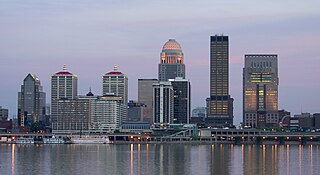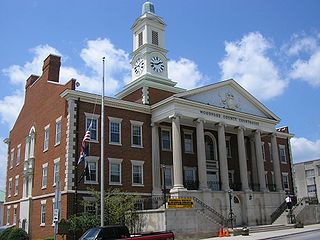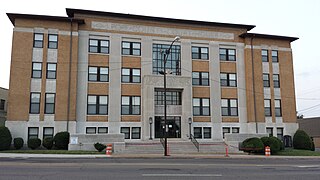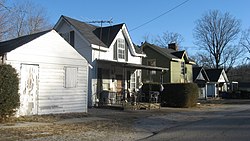
Berea College is a private liberal arts work college in Berea, Kentucky. Founded in 1855, Berea College was the first college in the Southern United States to be coeducational and racially integrated. The college provides a work-study grant that covers the remaining tuition fees after subtracting the total sum a student received from Pell Grant, other grants, and scholarships. Berea's primary service region is southern Appalachia but students come from more than 40 states in the United States and 70 other countries. Approximately one in three students identify as people of color.

Frankfort is the capital city of the U.S. state of Kentucky and the seat of Franklin County. It is a home rule-class city. The population was 28,602 at the 2020 United States census. Located along the Kentucky River, Frankfort is the principal city of the Frankfort, Kentucky Micropolitan Statistical Area, which includes all of Franklin and Anderson counties. It is the fourth smallest state capital city in the United States by population.

Louisville is the most populous city in the Commonwealth of Kentucky, sixth-most populous city in the Southeast, and the 27th-most-populous city in the United States. Louisville is the historical seat and, since 2003, the nominal seat of Jefferson County, on the Indiana border.

Woodford County is a county located in the U.S. state of Kentucky. As of the 2020 census, the population was 26,871. Its county seat is Versailles. The area was home to Pisgah Academy. Woodford County is part of the Lexington-Fayette, KY Metropolitan Statistical Area. It is located in the center of the Bluegrass region of Kentucky.

Mason County is a county located in the U.S. state of Kentucky. As of the 2020 census, the population was 17,120. Its county seat is Maysville. The county was created from Bourbon County, Virginia in 1788 and named for George Mason, a Virginia delegate to the U.S. Constitutional Convention known as the "Father of the Bill of Rights". Mason County comprises the Maysville, KY Micropolitan Statistical Area, which is included in the Cincinnati-Wilmington-Maysville, OH-KY-IN Combined Statistical Area.

Logan County is a county in the southwest Pennyroyal Plateau area of the U.S. Commonwealth of Kentucky. As of the 2020 census, the population was 27,432. Its county seat is Russellville.

Hopkins County is a county located in the western part of the U.S. state of Kentucky. As of the 2020 census, the population was 45,423. Its county seat is Madisonville. Hopkins County was created December 9, 1806 from Henderson County. It was named for General Samuel Hopkins, an officer in both the American Revolutionary War and War of 1812, and later a Kentucky legislator and U.S. Congressman.

Pope County is a county in the U.S. state of Arkansas. As of the 2020 census, the population was 63,381. The county seat is Russellville. The county was formed on November 2, 1829, from a portion of Crawford County and named for John Pope, the third governor of the Arkansas Territory. Pope County was the nineteenth county formed. The county's borders changed eighteen times in the 19th century with the creation of new counties and adjustments between counties. The current boundaries were set on 8 March 1877.

Russellville is the county seat and largest city in Pope County, Arkansas, United States, with a 2021 estimated population of 29,338. It is home to Arkansas Tech University. Arkansas Nuclear One, Arkansas' only nuclear power plant is nearby. Russellville borders Lake Dardanelle and the Arkansas River.

Russellville is a home rule-class city in Logan County, Kentucky, in the United States. It is the seat of its county. The population was 6,960 at the time of the 2010 census.
Black Bottom may refer to:
Samuel M. Plato (1882–1957) was an American architect and building contractor who is noted for his work on federal housing projects and U.S. post offices, as well as designing and building other structures in the United States such as private homes, banks, churches, and schools. During World War II, the Alabama native was one of the few African-American contractors in the country to be awarded wartime building contracts, which included Wake and Midway Halls. He also received contracts to build at least thirty-eight U.S. post offices across the country.
Bethel College was a Baptist-affiliated college in Kentucky founded in 1854 and closed in 1964. Throughout most of its history, the Hopkinsville campus was a women's college while the Russellville campus was a men's college.
The Freedom Singers originated as a quartet formed in 1962 at Albany State College in Albany, Georgia. After folk singer Pete Seeger witnessed the power of their congregational-style of singing, which fused black Baptist a cappella church singing with popular music at the time, as well as protest songs and chants. Churches were considered to be safe spaces, acting as a shelter from the racism of the outside world. As a result, churches paved the way for the creation of the freedom song. After witnessing the influence of freedom songs, Seeger suggested The Freedom Singers as a touring group to the SNCC executive secretary James Forman as a way to fuel future campaigns. Intrinsically connected, their performances drew aid and support to the Student Nonviolent Coordinating Committee (SNCC) during the emerging civil rights movement. As a result, communal song became essential to empowering and educating audiences about civil rights issues and a powerful social weapon of influence in the fight against Jim Crow segregation. Rutha Mae Harris, a former freedom singer, speculated that without the music force of broad communal singing, the civil rights movement may not have resonated beyond of the struggles of the Jim Crow South. Their most notable song “We Shall Not Be Moved” translated from the original Freedom Singers to the second generation of Freedom Singers, and finally to the Freedom Voices, made up of field secretaries from SNCC. "We Shall Not Be Moved" is considered by many to be the "face" of the Civil Rights movement. Rutha Mae Harris, a former freedom singer, speculated that without the music force of broad communal singing, the civil rights movement may not have resonated beyond of the struggles of the Jim Crow South. Since the Freedom Singers were so successful, a second group was created called the Freedom Voices.

The Confederate Monument in Russellville, in the middle of the Russellville Historic District of Russellville, Kentucky, is a monument to the Confederate States of America that is on the National Register of Historic Places since July 17, 1997.

The Russellville Historic District in Russellville, Kentucky, is in south central Kentucky. Among Kentuckian municipalities in its size range it has the largest historic district, comprising fifty separate city blocks. Another distinction is that the district is centered on the commercial corridor, instead of the county courthouse, unlike most county seats in Kentucky.

Alice Allison Dunnigan was an American journalist, civil rights activist and author. Dunnigan was the first African-American female correspondent to receive White House credentials, and the first black female member of the Senate and House of Representatives press galleries. She wrote an autobiography entitled Alice A. Dunnigan: A Black Woman's Experience. She is commemorated by an official Kentucky Historical Society marker.
Charles "Chuck" Neblett is a civil rights activist best known for helping to found and being a member of The Freedom Singers.
This is a list of protests brought on by the murders of Breonna Taylor and George Floyd in Kentucky, United States. In 2020, there were protests throughout Kentucky in reaction to the shooting of Breonna Taylor and murder of George Floyd by police, as well as the shooting of David McAtee by the Kentucky Army National Guard. The demonstrations happened regularly in the largest cities in Kentucky, including Louisville and Lexington. Many of the smaller cities had protests on at least one day.













